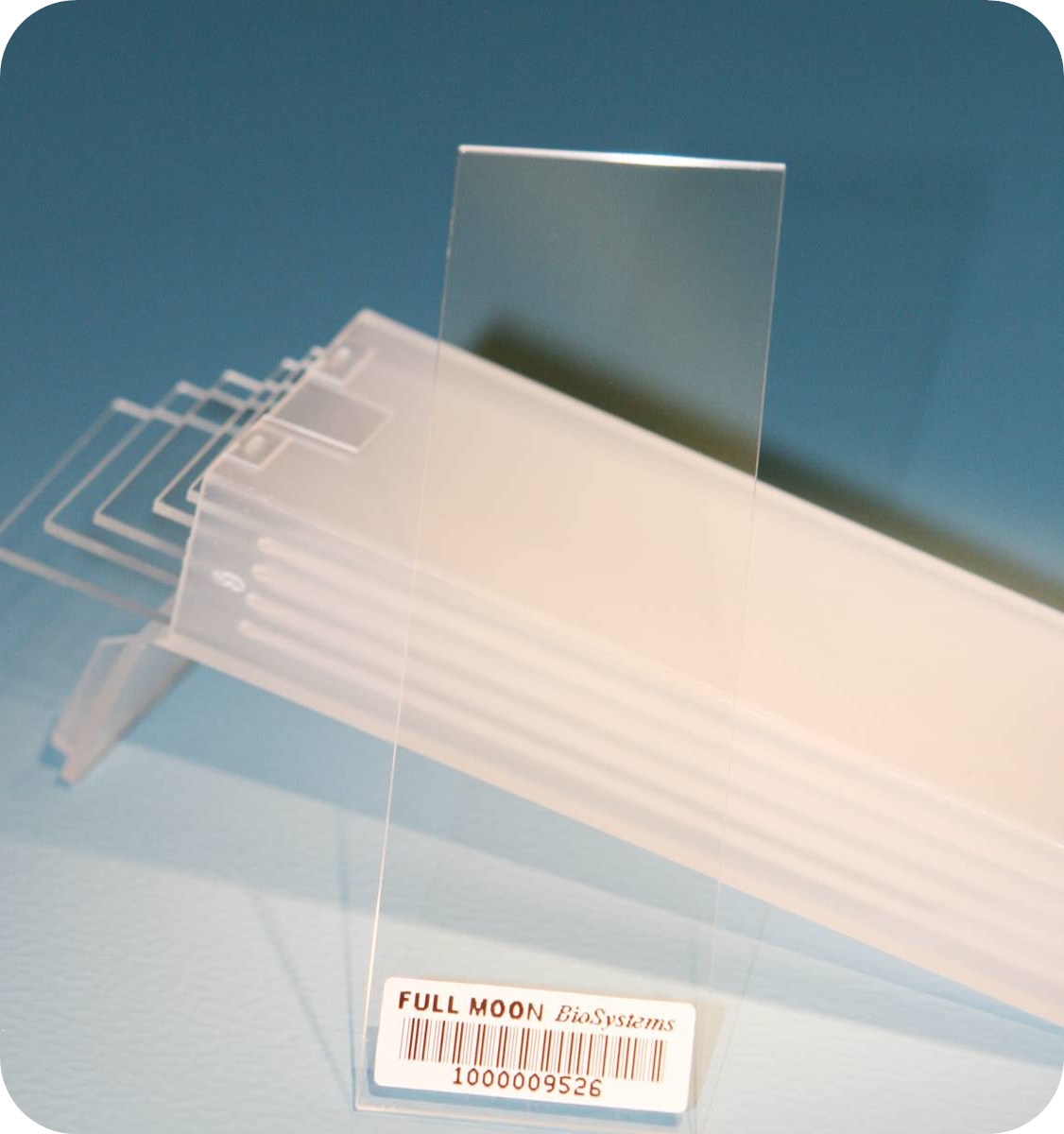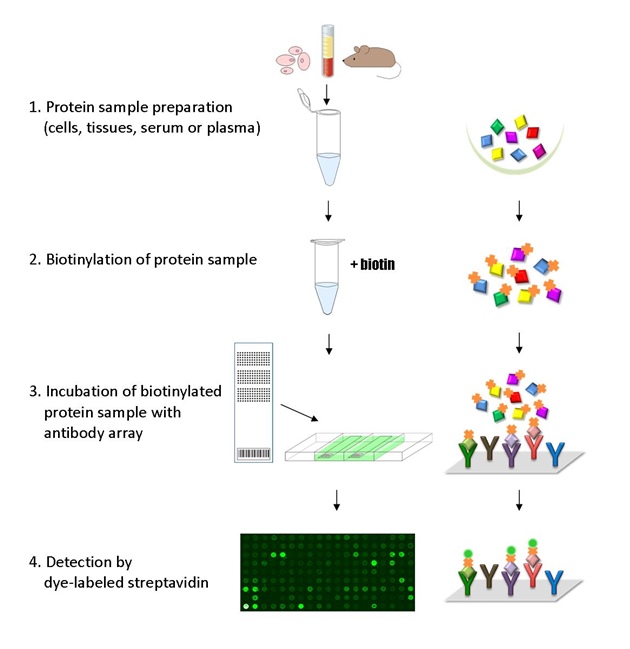High-Throughput Antibody Arrays
Our antibody arrays provide a high-throughput, ELISA-based solution for protein expression profiling across samples like cells, tissues, serum, and culture media. It offers greater productivity and cost savings compared to traditional Western Blots or ELISA.
Comprehensive Protein Profiling
Choose from our comprehensive arrays: Phospho Explorer Array, Signaling Explorer Array, and Explorer Antibody Array. Profile up to 1,358 biomarkers on a single slide, with options tailored to specific pathways in immunology, oncology, and cell biology.
Phosphorylation Profiling
Our phosphorylation profiling antibody arrays include the Phospho Explorer Array with 1318 antibodies and Pathway Phospho Arrays covering more than 25 different pathways. This platform features phospho-specific antibodies and paired site-specific antibodies for total protein. It is ideal for tyrosine, serine, and threonine phosphorylation analysis.
High-Quality, Reliable Arrays
Our antibody arrays feature antibodies covalently attached to premium glass with a 3D polymer coating for optimal binding and specificity. Each includes positive/negative controls and multiple replicates for accurate, reliable results.

HOW ANTIBODY ARRAY WORKS

The ELISA based antibody array platform involves four major steps:
1) Protein extraction with non-denaturing lysis buffer from cells, tissues, or serum samples
2) Biotinylation of protein sample
3) Incubation of labeled protein sample with antibody array
4) Detection by dye conjugated streptavidin
APPLICATIONS
- Qualitative protein expression profiling
- Compare profiles of normal, diseased or treated samples
- Measure phosphorylation changes at specific sites (Phospho Antibody Arrays)
- Identify candidate biomarkers
DETECTION METHOD
- Fluorescence
- Instrument: microarray scanner compatible with 76 x 25 x 1 mm (3 in. x 1 in. x 1mm) slides
- Commonly used compatible array scanners
SPECIFICATIONS
- Suitable samples: cells, tissues, serum, culture media
- Size: 2 Slides/Pack for processing two unique samples
- Slide dimensions: 76 x 25 x 1 mm
- Storage Condition : 4°C for 6 months
- Shipping Condition: 4°C with ice packs
Phospho Explorer Array
Signaling Explorer Array
| Catalog No | Description | Size | Price |
|---|---|---|---|
| APP069 | Apoptosis Antibody Array | 2 slides/pk | $420 |
| SCB200 | Cancer BioMarker Array | 2 slides/pk | $820 |
| ACC058 | Cell Cycle Antibody Array | 2 slides/pk | $370 |
| SCK100 | Cytokine Profiling Array | 2 slides/pk | $960 |
| ASB600 | Explorer Antibody Array | 2 slides/pk | $980 |
| SMA092 | Inflammation Antibody Array | 2 slides/pk | $460 |
| AVK276 | Kinase Antibody Array | 2 slides/pk | $850 |
| SMK060 | MAPK Signaling Array | 2 slides/pk | $380 |
| AST160 | Signal Transduction Array | 2 slides/pk | $630 |
| SET100 | Signaling Explorer Array | 2 slides/pk | $1,690 |
User's Guide
Reagent Kit Needed
FREQUENTLY ASKED QUESTIONS
Each pack of arrays comes with two identical slides. Each slide can be used to run a single sample. You will need two slides (1 pack) to run a pair of samples, an untreated sample and a treatment sample.
In addition to the array slides, you will need the Antibody Array Assay Kit and dye-streptavidin that is compatible with your scanner. Please see the User’s Guide for requirements of dye-streptavidin.
Compatible samples include cells, tissues, serum, culture media, and FFPE. Generally, the recommended lysate concentration is 2 ug/uL or higher with 80 – 150 ug of protein for each array.
The antibody array platform is semi-quantitative. The data provides relative fold changes between an untreated sample and a treated sample.
A microarray scanner is needed to image the arrays. Here is a list of commonly used scanners. If you don’t access to a scanner, please consider our free array scanning service.
Certain gel imagers, such as, GE Healthcare’s Typhoon Imager and Li-Cor’s Odyssey system, may be used to image analysis. However, some of the systems may not be equipped with analysis module for microarrays. Please verify your system’s capability before using.
The software application that comes with your microarray scanner can be used for image quantification/data extraction. For example, GenePix® Pro is the acquisition and analysis software for GenePix® scanners.
To expedite spot finding, GAL files are provided free of charge and can be downloaded from here. Most modern analysis software programs are compatible with GAL files. If you don’t have access to a commercial software, please consider our image analysis service or open-source software, ImageJ, made available by NIH.
Our Complete Assay Service allows researchers to send samples to our lab in Sunnyvale, California. The assay will be conducted by our experienced scientists, and results will be delivered in electronic format by email. The turnaround time depends on the number of samples to be assayed. For 2-4 samples, the current timeline is 5-15 business days. For more details, please visit our complete assay service section.
Visit our full FAQ section, or email us at .

JCI Insight
JCI Insight 2024 Apr 8;9(7):e172678.

Cancer Immunology Research
CLN-617 Retains IL2 and IL12 in Injected Tumors to Drive Robust and Systemic Immune-Mediated Antitumor Activity
Cancer Immunol Res. 2024 Aug 1;12(8):1022-1038.


